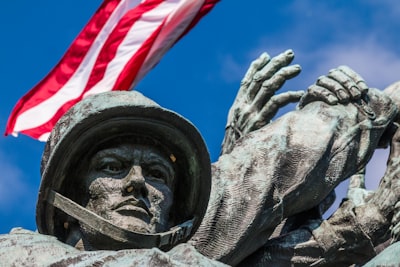- Knowing Your Purpose
- The 11 Leadership Principles of the USMC
- 1. Be Technically and Tactically Proficient
- 2. Know Yourself and Seek Self-Improvement
- 3. Know Your Marines and Look Out for Their Welfare
- 4. Keep Your Marines Informed
- 5. Set the Example
- 6. Ensure the Task is Understood, Supervised, and Accomplished
- 7. Train Your Marines as a Team
- 8. Make Sound and Timely Decisions
- 9. Develop a Sense of Responsibility in Your Subordinates
- 10. Seek Responsibility and Take Responsibility for Your Actions
- 11. Employ Your Unit in Accordance With its Capabilities
- Develop a Sense of Responsibility in Your Subordinates
- The 14 Leadership Traits of the Usmc
- Setting An Example for Others to Follow
- The Commander's Leadership Handbook and Preparedness
- Marine Corps Leadership in the Business World
- Personal Experiences of Former USMC
The Marine Corps Leadership Principles are a robust framework for developing strong leaders across different fields and industries. These time-tested principles draw on military experience and wisdom to offer valuable guidance for enhancing leadership skills and making a lasting impact. Let’s delve into the significance of these principles and what it takes to be an effective and influential leader, whether in the military or other contexts.
Knowing Your Purpose

Becoming a leader in the United States Marine Corps (USMC) requires more than just dedication and hard work. It requires knowing your purpose and understanding the mission of the Marine Corps. Your purpose goes beyond personal drive and extends to protecting your home and country.
The Marine Corps exists to uphold its core values of honor, courage, and commitment. As a member of the USMC, you must embrace this purpose and strive to live up to these values. While personal motivations may have led you to join the Marines, your mission as a leader is to serve the greater purpose of protecting and defending your nation.
Understanding the distinction between purpose and drive is essential. Drive may be what initially motivated you to join the Marine Corps, such as protecting loved ones or advancing yourself personally. However, your purpose as a Marine leader is to carry out the mission of the USMC and uphold its core values.
Staying motivated is crucial to being a successful Marine leader. Just like the Marine Corps Challenge Coin, a symbol of gratitude, honor, and loyalty, you should find ways to keep yourself motivated at all times. These challenge coins hold special memories and serve as priceless souvenirs. By displaying your pride as a Marine, you can keep your motivation high.
To be a leader in the Marines, you must also familiarize yourself with the 11 leadership principles and 14 leadership traits of the USMC. These principles and traits serve as the foundation for effective leadership in the Marine Corps.
The 11 Marine Corps Leadership Principles are guidelines that every Marine should be aware of and strive to live up to. These principles are not only essential for being a good leader but also for being a good Marine. They include being technically and tactically proficient, knowing yourself and seeking self-improvement, looking out for the welfare of your Marines, and setting the example. Other principles involve keeping your Marines informed, ensuring tasks are understood and accomplished, and training your Marines as a team.
In addition to the 11 leadership principles, the USMC emphasizes 14 leadership traits that Marines should develop. These traits are justice, judgment, dependability, initiative, decisiveness, tact, integrity, enthusiasm, bearing, unselfishness, courage, knowledge, loyalty, and endurance. These traits are vital for effective leadership and personal growth.
By embodying these leadership principles and traits, you can become a Marine leader who sets an example for others to follow. Leadership in the Marines is not just about achieving personal success but also about inspiring and encouraging others to be their best. The USMC leadership principles and traits provide a framework for Marines to develop as leaders and contribute to the betterment of their unit and the Marine Corps as a whole.
Knowing your purpose is essential to embodying the Marine Corps leadership principles. Your purpose as a Marine leader extends beyond personal motivations and aligns with the mission of the USMC. By understanding and embracing the 11 leadership principles and 14 leadership traits, you can grow as a leader and make a meaningful impact as a member of the Marine Corps.
The 11 Leadership Principles of the USMC
The United States Marine Corps (USMC) is known for its outstanding discipline and leadership. Marines possess qualities that set them apart, and these leadership principles can be applied not only in the military but also in any professional setting. The 11 leadership principles of the USMC provide a framework for effective leadership and emphasize the importance of continuous self-improvement, teamwork, and making sound decisions:
1. Be Technically and Tactically Proficient
A good leader, just like a good Marine, should possess technical and tactical proficiency. Continuous learning and training are essential to enhance leadership skills. Leaders must stay updated on the latest knowledge and maintain a high level of expertise in their field.
2. Know Yourself and Seek Self-Improvement
Self-awareness is crucial for effective leadership. Recognizing your strengths and weaknesses allows you to focus on personal growth and development. Leading by example, being adaptable, and knowing your limits are key traits of a good leader.
3. Know Your Marines and Look Out for Their Welfare
Leadership is not just about giving orders; it’s about taking care of your team. To lead effectively, you must establish a personal connection with your Marines, understand their needs, and prioritize their well-being. Effective communication and genuine concern for your team members are essential for mission accomplishment.
4. Keep Your Marines Informed
Transparency and open communication are vital in leadership. Keeping your team members informed about plans, changes, and expectations fosters trust and ensures everyone is on the same page. Informed Marines are better equipped to make decisions and perform their tasks efficiently.
5. Set the Example
A leader’s actions speak louder than words. Setting high standards for yourself and exhibiting moral principles will inspire your team to follow suit. By leading by example, you become a role model, earning the respect and trust of your Marines.
6. Ensure the Task is Understood, Supervised, and Accomplished
Clear communication is essential for successful mission execution. As a leader, you must effectively convey tasks and expectations to your team. Providing supervision and guidance enables your Marines to understand their roles and work towards accomplishing the mission.
7. Train Your Marines as a Team
Individual skills are important, but teamwork is paramount. Developing a cohesive and high-performing team requires ongoing training. Team-building exercises, collaboration, and fostering communication help create a strong unit, where Marines rely on each other’s abilities and strengths.
8. Make Sound and Timely Decisions
As a leader, you must be able to make rational decisions quickly and efficiently. Evaluating all relevant information and considering the potential consequences of your decisions is crucial. A decisive leader instills confidence in their team and ensures timely execution of tasks.
9. Develop a Sense of Responsibility in Your Subordinates
Empowering your subordinates to take ownership and responsibility for their actions is essential for their growth and the overall success of the team. Encouraging accountability and fostering a sense of responsibility instills discipline and professionalism in your Marines.
10. Seek Responsibility and Take Responsibility for Your Actions
A good leader actively seeks challenging assignments and takes responsibility for their decisions and actions. By leading with integrity and accountability, you inspire your team to do the same. Embracing responsibility is a critical trait of effective leadership.
11. Employ Your Unit in Accordance With its Capabilities
Understanding the strengths and weaknesses of your Marines allows you to assign tasks effectively. By placing your team members in roles suited to their abilities, you set them up for success. Building a strong team and aligning their capabilities with mission requirements are key aspects of effective leadership.
These 11 leadership principles serve as a guide for Marine leaders and can be applied in various professional settings. By embracing these principles, aspiring leaders can greatly enhance their ability to lead effectively and achieve success in their respective fields.
The Marine Corps Leadership Principles provide a solid foundation for personal and professional growth. Whether you are a Marine or a professional in any industry, embodying these principles will make you a better leader. By continuously improving yourself, empowering your team, and making sound decisions, you can inspire those around you and achieve exceptional results.
Develop a Sense of Responsibility in Your Subordinates

Developing a sense of responsibility in your subordinates is a crucial aspect of effective leadership within the Marine Corps. Without this sense of responsibility, it becomes difficult to ensure that tasks are carried out efficiently and that the overall mission is accomplished successfully. As a leader, it is your duty to instill in your subordinates a clear understanding of their roles and responsibilities, along with a strong sense of accountability for their actions.
To develop this principle, you must first lead by example. Show your subordinates what it means to take responsibility for your own actions and decisions, and demonstrate the importance of holding oneself accountable. When your subordinates see that you take responsibility for your actions, they will be more likely to follow suit.
Encourage open communication within your team, fostering an environment where individuals feel comfortable speaking up about their concerns or any mistakes they may have made. Creating a space where subordinates feel safe to admit to their mistakes is essential in developing a sense of responsibility among them. Instead of blaming or punishing them for errors, focus on using these mistakes as learning opportunities and encouraging growth.
Assign tasks and delegate authority to your subordinates, allowing them to take ownership of their assigned responsibilities. This not only empowers them but also gives them a sense of pride and accomplishment when they successfully complete their tasks. Provide guidance and support as needed, but allow them the freedom to make decisions and take initiative. By giving subordinates these opportunities, you are showing them that you trust their capabilities and believe in their ability to fulfill their obligations.
Set clear expectations for your subordinates and hold them to those standards. Clearly communicate the goals and objectives of the mission and provide the necessary resources and training for them to succeed. Regularly evaluate their performance and provide constructive feedback to help them improve and grow. Recognize and acknowledge their achievements and efforts, reinforcing the importance of their contribution to the team’s success.
Encourage a culture of learning and personal development within your team. Provide opportunities for training and professional growth, allowing subordinates to expand their knowledge and skills. By investing in their development, you are demonstrating a commitment to their success and fostering a sense of responsibility in their own growth and improvement.
Ultimately, by developing a sense of responsibility in your subordinates, you are creating a team that is accountable, reliable, and driven. The success of your mission relies on the collective effort and commitment of each individual within your team. By instilling a sense of responsibility in your subordinates, you are cultivating a culture of excellence and ensuring that the Marine Corps leadership principles are upheld at every level.
The 14 Leadership Traits of the Usmc
The United States Marine Corps (USMC) places a great emphasis on leadership and has identified 14 key leadership traits that are essential for its members. These traits serve as a guide for Marines to develop and exhibit the qualities necessary for effective leadership. Let’s take a closer look at these 14 leadership traits:
1. Justice
A leader must act fairly and consistently, administering rewards and punishments impartially. Justice builds trust and maintains discipline within the team.
2. Judgment
The ability to make informed decisions based on careful analysis of facts and possible courses of action. Effective leaders exercise sound judgment in order to guide their team towards success.
3. Dependability
Being reliable and trustworthy is crucial for a leader. Dependability ensures that team members can count on their leader to fulfill their obligations and meet their responsibilities.
4. Initiative
A leader should actively take charge and make things happen, rather than waiting for others to take the lead. Initiative involves being proactive and showing a willingness to go above and beyond.
5. Decisiveness
Making timely decisions with confidence is a hallmark of a good leader. Decisiveness is crucial in high-pressure situations and allows for the efficient accomplishment of tasks.
6. Tact
Having the ability to communicate effectively and adapt one’s approach to different situations. Tactful leaders are able to maintain good relations with their team members and navigate challenging conversations with diplomacy.
7. Integrity
Leaders with integrity uphold high moral principles and act ethically in all situations. They are honest, trustworthy, and lead with integrity, which earns them the respect and loyalty of their team.
8. Enthusiasm
A leader who is enthusiastic about their work and mission inspires their team members to share that same enthusiasm. Leaders who display enthusiasm create a positive and motivating environment.
9. Bearing
Having a professional and composed demeanor is important for a leader. Bearing refers to the way a leader carries themselves, projecting confidence, and commanding respect.
10. Unselfishness
A leader should prioritize their team’s welfare over personal gain. Unselfish leaders are willing to make sacrifices and put the needs of their team above their own.
11. Courage
True leadership requires the ability to act bravely and confidently, even in the face of fear or adversity. Courageous leaders lead by example and inspire bravery in their team.
12. Knowledge
A leader should continuously seek knowledge and understanding in order to make informed decisions and provide guidance to their team. Knowledge empowers leaders to effectively lead and solve problems.
13. Loyalty
Leaders must be loyal to their team, their organization, and their values. Loyalty builds trust and fosters a sense of unity within the team.
14. Endurance
Leadership requires mental and physical stamina. Endurance enables leaders to persevere through challenges and setbacks, inspiring their team to do the same.
These 14 leadership traits serve as a comprehensive guide for aspiring leaders in the USMC. By internalizing and cultivating these traits, Marines can develop the skills necessary to effectively lead and accomplish their missions. Regardless of the industry, these leadership traits can be valuable for any individual seeking to enhance their leadership abilities and make a positive impact on their team.
Setting An Example for Others to Follow

One of the most important principles of Marine Corps leadership is setting an example for others to follow. Marines are expected to lead by personal example and maintain high standards for themselves and their team. By embodying the core values of the Marine Corps, leaders inspire and motivate their subordinates to achieve greatness.
To set the example, leaders must demonstrate professionalism, discipline, and integrity in everything they do. They must prioritize physical fitness, maintain a professional appearance, and adhere to personal habits that are not open to criticism. By embodying these qualities, leaders command the respect and admiration of their Marines.
Leaders must also lead with a positive attitude and an unwavering commitment to the mission. They must maintain an optimistic outlook and show enthusiasm for their work, regardless of the challenges they face. This positive energy permeates the team and fosters a culture of motivation and determination.
In addition to personal conduct, leaders must also set the example in their decision-making and problem-solving. They must demonstrate sound judgment and decisiveness, making rational and timely decisions based on a thorough understanding of the situation. Leaders must also be willing to take responsibility for their actions, accepting praise and criticism with humility.
By consistently setting the example, Marine Corps leaders cultivate a culture of excellence. Their actions become a model for their subordinates, encouraging them to strive for greatness and develop their own leadership qualities. When leaders lead by example, they inspire trust and confidence in their team, building a strong foundation for success.
In a professional setting, this principle can be applied to business leadership as well. Business leaders should prioritize professionalism, discipline, and integrity, serving as role models for their employees. By embodying these qualities, leaders create a positive and productive work environment.
Business leaders should also lead with a positive attitude and a commitment to the mission. They should approach challenges with enthusiasm and motivate their team to achieve their goals. By setting a positive example, leaders inspire their employees to work harder and reach their full potential.
Leaders must also make sound decisions and take responsibility for the outcomes. They should demonstrate good judgment and decisiveness, guiding their team towards success. By accepting responsibility for their actions, leaders show integrity and build trust with their employees.
Setting an example for others to follow is a fundamental principle of Marine Corps leadership. By embodying the core values of the Marine Corps and leading by personal example, leaders inspire and motivate their subordinates to achieve greatness. This principle is applicable not only in the military but also in business leadership, as leaders who set the example create a positive and productive work environment.
The Commander’s Leadership Handbook and Preparedness
The United States Marine Corps (USMC) has a long-standing tradition of excellence and leadership. The Commander’s Leadership Handbook, written by General Robert B. Neller, serves as a guide for Marines and prospective commanders alike. It emphasizes the importance of preparedness and being ready to take on advanced leadership roles when the opportunity presents itself. This principle of preparedness is at the core of Marine Corps leadership.
To become a leader in the USMC, the first step is to know your purpose. This means distinguishing between your personal drive and your mission as a member of the USMC. It is important to stay motivated and to use symbols of pride, such as challenge coins, to keep yourself motivated.
The 11 leadership principles and 14 leadership traits of the USMC are essential to learn and practice. The 11 leadership principles highlight the key qualities and actions that leaders must exhibit. These principles include being technically and tactically proficient, knowing oneself and seeking self-improvement, looking out for the welfare of your Marines, and setting the example. These principles provide a roadmap for leaders to follow and are the foundation of effective leadership.
The 14 leadership traits of the USMC focus on the personal qualities that leaders should possess. These traits include justice, judgment, dependability, initiative, decisiveness, tact, integrity, enthusiasm, bearing, unselfishness, courage, knowledge, loyalty, and endurance. These traits are essential for a Marine leader to possess and develop. They form the basis of character and integrity that is expected of every Marine.
Being a great leader is about setting an example for others to follow. It is about being the best you can be and encouraging others to do the same. The USMC leadership principles and traits exist to guide Marines on their journey to becoming great leaders. These principles are the moral foundation of being a Marine and are essential for personal and collective growth.
The Commander’s Leadership Handbook and the Marine Corps leadership principles provide a framework for effective leadership in the USMC. These principles emphasize the importance of self-improvement, knowing oneself, and seeking honest evaluations to identify strengths and weaknesses. They also emphasize the need for technical and tactical proficiency in order to effectively lead and accomplish tasks. By following these principles, leaders can enhance their effectiveness and achieve their goals.
Marine Corps Leadership in the Business World

Leadership is a crucial skill in both the military and the business world. The core principles and traits of Marine Corps leadership can be applied to any professional setting to create a productive and cohesive team. Here are some key ways in which Marine Corps leadership principles can be utilized in the business world:
1. Leading by Example
In the military, leaders are expected to set the standard by leading from the front. This principle can be applied to the business world by demonstrating a strong work ethic, integrity, and professionalism. By leading by example, business leaders can inspire their employees to follow suit and uphold high standards.
2. Accountability
In the Marine Corps, leaders are held accountable for their actions and the outcomes of their decisions. This principle translates to the business world by taking responsibility for one’s actions and holding others accountable as well. By fostering a culture of accountability, businesses can ensure that everyone is working towards their goals and taking ownership of their work.
3. Teamwork
Marines are trained to work as a team and rely on one another to accomplish their mission. This teamwork principle can be applied in the business world by fostering a collaborative work environment where employees support and help each other. By encouraging teamwork, businesses can leverage the diverse skills and perspectives of their employees to achieve greater success.
4. Effective Communication
Clear and timely communication is crucial in the military, and the same applies to the business world. Leaders should ensure that their instructions are understood, provide necessary feedback and guidance, and keep their employees informed about important updates and changes. By promoting effective communication, businesses can minimize misunderstandings and enhance productivity.
5. Adaptability
The Marine Corps emphasizes the ability to adapt to changing circumstances and make quick decisions. This adaptability principle is highly relevant in the ever-changing business landscape. Business leaders should be agile and willing to adjust their strategies and plans to meet new challenges. By embracing adaptability, businesses can stay ahead of the competition and navigate uncertain times more effectively.
6. Continual Learning
Marines are encouraged to seek self-improvement and actively pursue knowledge and skills development. This principle can be applied in the business world by promoting a culture of continuous learning among employees. Business leaders should invest in employee training and development programs to enhance their skills and knowledge. By fostering a learning culture, businesses can stay innovative and competitive.
7. Building Trust
Trust is a fundamental component of Marine Corps leadership, and it is equally important in the business world. Leaders should prioritize building trust with their employees by being transparent, reliable, and consistent in their actions. By fostering trust, businesses can create a positive work environment where employees feel valued and motivated.
By incorporating these Marine Corps leadership principles, business leaders can cultivate a strong and effective leadership style that fosters productivity, teamwork, and success. The core values of the Marine Corps can be a powerful guide for leaders in any professional setting, allowing them to inspire and lead their teams to achieve their goals.
Personal Experiences of Former USMC

Antonio Centeno, a former US Marine, shares valuable leadership principles he learned in the Marine Corps that he still applies to his life and business today. One key principle is leading by example, setting a high personal standard and being able to meet that standard. Another important principle is honor, valuing an uncompromising code of integrity and respect for human dignity at all times.
Courage is a vital principle in the Marine Corps, encompassing physical, mental, and moral aspects. This means pushing oneself to exceed expectations and always choosing to do the right thing, even when nobody is watching. Commitment is equally essential, characterized by the dedicated determination to accomplishing the mission regardless of circumstances.
Respecting history and tradition is a guiding principle in the Marine Corps, which entails understanding existing systems and showing appreciation for the hard work that came before. Successful leaders in the Marine Corps must also be both self-reliant and good team players, independent enough to function without constant supervision, and collaborative enough to work effectively with others.
Ensuring everyone understands the commander’s intent is crucial for unified action and achieving common goals. Encouraging initiative is also essential, empowering people to take responsibility and solve problems proactively. The right mindset is a driving force in the Marine Corps; former Marines like Centeno emphasize staying positive, embracing challenges, and always striving to overcome obstacles.
Another former Marine, Major Scott Husing, shares his experiences leading his company in intense fighting during the surge strategy in Ramadi in 2006. Major Husing’s emphasis on leadership and the power of human connection highlights the importance of these qualities in any area of life, not just in military settings.
Major Husing discusses the importance of listening, continual learning, and surrounding oneself with intelligent and capable individuals. This mindset is essential for success in any leadership role, whether it is in the military or another business or organizational setting.
Additionally, Major Husing highlights the challenges faced by veterans, notably the high rates of suicide. He is actively involved in supporting veterans and their families through the organization Save the Brave, underscoring that leadership, compassion, and responsibility extend beyond one’s active service in the military.
In addressing recent social unrest, Major Husing emphasizes the need for effective leadership and unity in moving forward. Compassion, caring, and responsibility are core values that leaders can apply when addressing conflicts or difficult situations.
The leadership principles learned in the Marine Corps, exemplified by former Marines Antonio Centeno and Major Scott Husing, can be applied to various aspects of life, both personal and professional. These values of perseverance, honor, courage, and commitment serve as guideposts for success and fulfillment.
In conclusion, the Marine Corps Leadership Principles provide a solid foundation for developing effective leaders in the military and beyond. These principles emphasize the importance of knowing your purpose, leading by example, and embracing qualities such as integrity, courage, and commitment. By embodying these principles, leaders can create a positive and productive work environment, inspire their team members, and achieve exceptional results.







